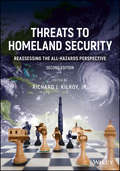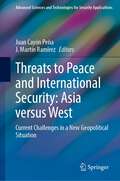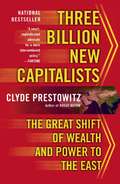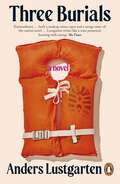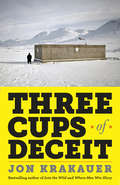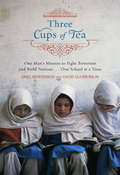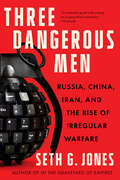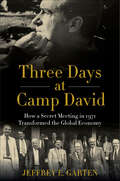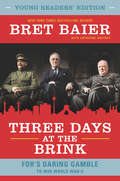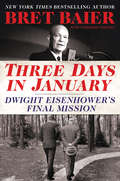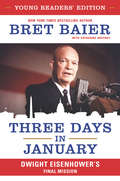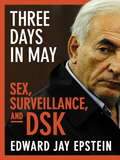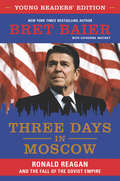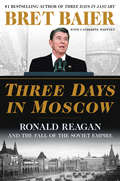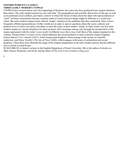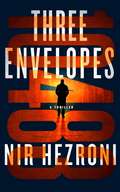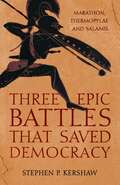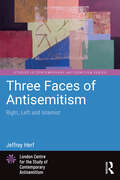- Table View
- List View
Threats to Homeland Security: Reassessing the All-Hazards Perspective
by Richard J. Kilroy Jr.Addresses threats to homeland security from terrorism and emergency management from natural disasters Threats to Homeland Security, Second Edition examines the foundations of today's security environment, from broader national security perspectives to specific homeland security interests and concerns. It covers what we protect, how we protect it, and what we protect it from. In addition, the book examines threats from both an international perspective (state vs non-state actors as well as kinds of threat capabilities—from cyber-terrorism to weapons of mass destruction) and from a national perspective (sources of domestic terrorism and future technological challenges, due to globalization and an increasingly interconnected world). This new edition of Threats to Homeland Security updates previous chapters and provides new chapters focusing on new threats to homeland security today, such as the growing nexus between crime and terrorism, domestic and international intelligence collection, critical infrastructure and technology, and homeland security planning and resources—as well as the need to reassess the all-hazards dimension of homeland security from a resource and management perspective. Features new chapters on homeland security intelligence, crime and domestic terrorism, critical infrastructure protection, and resource management Provides a broader context for assessing threats to homeland security from the all-hazards perspective, to include terrorism and natural disasters Examines potential targets at home and abroad Includes a comprehensive overview of U.S. policy, strategy, and technologies for preventing and countering terrorism Includes self-assessment areas, key terms, summary questions, and application exercises. On-line content includes PPT lessons for each chapter and a solutions key for academic adopters Threats to Homeland Security, Second Edition is an excellent introductory text on homeland security for educators, as well as a good source of training for professionals in a number of homeland security-related disciplines.
Threats to Peace and International Security: Current Challenges in a New Geopolitical Situation (Advanced Sciences and Technologies for Security Applications)
by J. Martín Ramírez Juan Cayón PeñaThis book aims to analyze from a multidisciplinary perspective the current geopolitical conflict between East and West, between two differentiated and apparently conflicting cosmogonic visions. The geopolitical evolution of the current panorama seems to lead to a new world in the field of international relations, a new board played on a planetary level. Once again, bloc geopolitics can be glimpsed in the immediate future, in which the most important actors such as Russia, China, the United States of America, and the European Union are called to position themselves with respect to the territorial and strategic ambitions of the opponent. International law seems to be overwhelmed by military actions and factual pressure on the ground, while the battle of ideas extends to the technological field and cyberspace. The different origins of the authors, with extensive academic, military, police forces, and business experience undoubtedly enriches the unique perspective that this work intends to address, always in the attempt to enforce international law and the channels of dialogue between nations, such as the best solution to conflicts.
Three Billion New Capitalists: The Great Shift of Wealth and Power to the East
by Clyde V. PrestowitzAmerican superiority is deteriorating faster than you think. Powerful trends are converging to rapidly shift wealth and power to Asia-and, as acclaimed international trade expert Clyde Prestowitz shows, geopolitical clout will follow economic strength. Now we have to cope with the fallout. How will we deal with a world in which the dollar is no longer the dominant currency, the United States is no longer the dominant power, and people in Slovenia, Singapore, and Seattle are all competing for the same work on the same terms? Three Billion New Capitalists is a clear-eyed and profoundly unsettling look at America's and the world's economic future.
Three Bio-Realms
by G. Bruce Doern Michael J. PrinceBiotechnology has become one of the most important issues in public policy and governance, altering the boundaries between the public and the private, the economic and the social, and further complicating the divide between what is scientifically possible and ethically preferred. Given the importance of biotechnology in shaping relations between the state, science, the economy, and the citizenry, a book that explores the Canadian biotechnology regime and its place in our democracy is timelier than ever.Three Bio-Realms provides the first integrated examination of the thirty-year story of the democratic governance of biotechnology in Canada. G. Bruce Doern and Michael J. Prince, two recognized specialists in governance innovation and social policy, look at particular 'network-based' factors that seek to promote and to regulate biotechnology inside the state as well as at broader levels. Unmatched by any other book in its historical scope and range, Three Bio-Realms is sure to be read for years to come.
Three Burials: An electrifying, darkly comic debut novel from an award-winning playwright
by Anders LustgartenA THE TIMES BEST CRIME BOOK OF 2024‘Extraordinary . . . both a madcap crime caper and a savage state-of-the-nation novel . . . Anders Lustgarten writes like a man possessed: bursting with energy’ The TimesAn electrifying wild ride of a debut novel from award-winning playwright Anders LustgartenMeet Cherry, a bandit queen on the run, driving a pink soft-top convertible through the badlands of South-East England. She's never felt more Thelma & Louise in her life - except there are three of them in the car and one of them is dead.How did a head nurse and mother of two end up driving a handcuffed policeman and the corpse of a murdered refugee on a journey to find justice? Pursued by a racist, roid-raged, shaven-headed officer of the law - not to mention by her husband and daughter - what else can a woman with a conscience do in modern Britain?Thrilling, radical and darkly comedic, Anders Lustgarten's open-hearted storm of a book explores pressing political concerns with clear-sightedness and holds a mirror up to contemporary Britain.‘An irreverent, tragicomic tour de force as absurd and as urgent as hope . . . Lustgarten’s novel is comedy as weapon and deep moral inquiry’ Guardian
Three Cartesian Feminist Treatises
by Vivien Bosley François Poullain de la Barre Marcelle Maistre WelchOne of the most radical feminist theorists in Europe before the nineteenth century, François Poullain de la Barre (1647-1723) was a man way ahead of his time. Applying Cartesian principles to "the Woman Question," Poullain demonstrated by rational deduction that the supposedly "self-evident" inequality of the sexes was nothing more than unfounded prejudice. Poullain published three books (anonymously) on this topic in the 1670s, all of which are included in English translation in this volume. In On the Equality of the Two Sexes he argued that the supposedly "natural" inferiority of women was culturally produced. To help women recognize and combat this prejudice, Poullain advocated a modern, enlightened feminine education in On the Education of Ladies. Finally, since his contemporaries largely ignored Poullain's writings, he offered a rebuttal to his own arguments in On the Excellence of Men—a rebuttal that he promptly countered, strengthening his original positions. A truly modern feminist, Poullain laid the intellectual groundwork for the women's liberation movement centuries before it happened.
Three Civilizations, Two Cultures, One State: Canada’s Political Traditions
by Douglas VerneyThis volume examines 150 years of Canadian political life in light if one of the country's most intractable problems, its cultural identity. Although many thoughtful Canadians remain dubious about the existence of a truly Canadian way of life, Douglas Verney argues that in fact Canada's political traditions embody and reflect a unique culture; and that although the Canadian government has been the primary instrument for nurturing this culture, it has been at the same time the entity most guilty of obscuring and ignoring it.
Three Cups of Deceit: How Greg Mortenson, Humanitarian Hero, Lost His Way
by Jon KrakauerGreg Mortenson, the bestselling author of Three Cups of Tea, is a man who has built a global reputation as a selfless humanitarian and children’s crusader, and he’s been nominated for the Nobel Peace Prize. But, as Jon Krakauer demonstrates in this extensively researched and penetrating book, he is not all that he appears to be. Based on wide-ranging interviews with former employees, board members, and others who have intimate knowledge of Mortenson and his charity, the Central Asia Institute, Three Cups of Deceit uncovers multiple layers of deception behind Mortenson’s public image. Was his crusade really inspired by a desire to repay the kindness of villagers who nursed him back to health when he became lost on his descent down K2? Was he abducted and held for eight days by the Taliban? Has his charity built all of the schools that he has claimed? This book is a passionately argued plea for the truth, and a tragic tale of good intentions gone very wrong. 100% of Jon Krakauer’s proceeds from the sale of Three Cups of Deceit will be donated to the “Stop Girl Trafficking” project at the American Himalayan Foundation (www.himalayan-foundation.org/live/project/stopgirltrafficking).
Three Cups of Tea
by Greg Mortenson David Oliver RelinGreg Mortenson stumbled, lost and delirious, into a remote Himalayan village after a failed climb up K2. The villagers saved his life, and he vowed to return and build them a school. The remarkable story of his promise kept is now perfect for reading aloud. Told in the voice of Korphe’s children, this story illuminates the humanity and culture of a relevant and distant part of the world in gorgeous collage, while sharing a riveting example of how one person can change thousands of lives. .
Three Cups of Tea
by Greg Mortenson David Oliver RelinThe astonishing, uplifting story of a real-life Indiana Jones and his humanitarian campaign to use education to combat terrorism in the Taliban's backyard Anyone who despairs of the individual's power to change lives has to read the story of Greg Mortenson, a homeless mountaineer who, following a 1993 climb of Pakistan's treacherous K2, was inspired by a chance encounter with impoverished mountain villagers and promised to build them a school. Over the next decade he built fifty-five schools--especially for girls--that offer a balanced education in one of the most isolated and dangerous regions on earth. As it chronicles Mortenson's quest, which has brought him into conflict with both enraged Islamists and uncomprehending Americans, Three Cups of Tea combines adventure with a celebration of the humanitarian spirit.
Three Cycles: Housing, Credit, and Real Activity
by Alain Kabundi Natalia Tamirisa Francisco Nadal De Simone Deniz Igan Marcelo PinheiroA report from the International Monetary Fund.
Three Dangerous Men: Russia, China, Iran And The Rise Of Irregular Warfare
by Seth G. JonesHow three key figures in Moscow, Beijing, and Tehran built ruthless irregular warfare campaigns that are eroding American power. In Three Dangerous Men, defense expert Seth Jones argues that the US is woefully unprepared for the future of global competition. While America has focused on building fighter jets, missiles, and conventional warfighting capabilities, its three principal rivals—Russia, Iran, and China—have increasingly adopted irregular warfare: cyber attacks, the use of proxy forces, propaganda, espionage, and disinformation to undermine American power. Jones profiles three pioneers of irregular warfare in Moscow, Beijing, and Tehran who adapted American techniques and made huge gains without waging traditional warfare: Russian Chief of Staff Valery Gerasimov; the deceased Iranian Major General Qassem Soleimani; and vice chairman of China’s Central Military Commission Zhang Youxia. Each has spent his career studying American power and devised techniques to avoid a conventional or nuclear war with the US. Gerasimov helped oversee a resurgence of Russian irregular warfare, which included attempts to undermine the 2016 and 2020 US presidential elections and the SolarWinds cyber attack. Soleimani was so effective in expanding Iranian power in the Middle East that Washington targeted him for assassination. Zhang Youxia presents the most alarming challenge because China has more power and potential at its disposal. Drawing on interviews with dozens of US military, diplomatic, and intelligence officials, as well as hundreds of documents translated from Russian, Farsi, and Mandarin, Jones shows how America’s rivals have bloodied its reputation and seized territory worldwide. Instead of standing up to autocratic regimes, Jones demonstrates that the United States has largely abandoned the kind of information, special operations, intelligence, and economic and diplomatic action that helped win the Cold War. In a powerful conclusion, Jones details the key steps the United States must take to alter how it thinks about—and engages in—competition before it is too late.
Three Days at Camp David: How a Secret Meeting in 1971 Transformed the Global Economy
by Jeffrey E. GartenThe former dean of the Yale School of Management and Undersecretary of Commerce in the Clinton administration chronicles the 1971 August meeting at Camp David, where President Nixon unilaterally ended the last vestiges of the gold standard—breaking the link between gold and the dollar—transforming the entire global monetary system.Over the course of three days—from August 13 to 15, 1971—at a secret meeting at Camp David, President Richard Nixon and his brain trust changed the course of history. Before that weekend, all national currencies were valued to the U.S. dollar, which was convertible to gold at a fixed rate. That system, established by the Bretton Woods Agreement at the end of World War II, was the foundation of the international monetary system that helped fuel the greatest expansion of middle-class prosperity the world has ever seen. In making his decision, Nixon shocked world leaders, bankers, investors, traders and everyone involved in global finance. Jeffrey E. Garten argues that many of the roots of America’s dramatic retrenchment in world affairs began with that momentous event that was an admission that America could no longer afford to uphold the global monetary system. It opened the way for massive market instability and speculation that has plagued the world economy ever since, but at the same time it made possible the gigantic expansion of trade and investment across borders which created our modern era of once unimaginable progress.Based on extensive historical research and interviews with several participants at Camp David, and informed by Garten’s own insights from positions in four presidential administrations and on Wall Street, Three Days at Camp David chronicles this critical turning point, analyzes its impact on the American economy and world markets, and explores its ramifications now and for the future.
Three Days at the Brink: FDR's Daring Gamble to Win World War II
by Catherine Whitney Bret BaierThis young readers’ edition from New York Times bestselling author and Fox News anchor Bret Baier dives into the first of the secret World War II meetings between President Franklin Roosevelt, Winston Churchill, and Joseph Stalin, which would shape the world for decades to come.In the process, it tells the story of the personal and political evolution of Roosevelt, and how he came to be the man who orchestrated the most decisive conference of the war. Following Germany’s invasion of the USSR in June 1941, Prime Minister Winston Churchill offered his support to the Soviets. But by the time the United States entered what had become the second World War in history, it became crucial for the Allied forces to better align themselves against the Axis powers.This meeting of the minds took place in Tehran, and in attendance were some of the most iconic leaders of the twentieth century: Franklin Delano Roosevelt, Winston Churchill, and Joseph Stalin.Though America, Britain, and the Soviet Union all had a common enemy, their political goals differed greatly. This young readers’ edition will explore how their united stance against Nazi Germany allowed them to mend their differences, paving the way for what eventually became one of the most important victories in world history.This book, which includes an insert of photographs from that time, tells the inside story of their secret conference.
Three Days in January: Dwight Eisenhower's Final Mission
by Catherine Whitney Bret Baier<p>January 1961: President Eisenhower has three days to secure the nation's future before his young successor, John F. Kennedy, takes power — a final mission by the legendary leader who planned D-Day and guided America through the darkening Cold War <P>Bret Baier, the Chief Political Anchor for Fox News Channel and the Anchor and Executive Editor of Special Report with Bret Baier, illuminates the extraordinary yet underappreciated presidency of Dwight Eisenhower by taking readers into Ike's last days in power. Baier masterfully casts the period between Eisenhower's now-prophetic farewell address on the evening of January 17, 1961, and Kennedy's inauguration on the afternoon of January 20 as the closing act of one of modern America's greatest leaders — during which Eisenhower urgently sought to prepare both the country and the next president for the challenges ahead. <P>Those three days in January 1961, Baier shows, were the culmination of a lifetime of service that took Ike from rural Kansas to West Point, to the battlefields of World War II, and finally to the Oval Office. When he left the White House, Dwight Eisenhower had done more than perhaps any other modern American to set the nation, in his words, "on our charted course toward permanent peace and human betterment." <P>On January 17, Eisenhower spoke to the nation in one of the most remarkable farewell speeches in U.S. history. Ike looked to the future, warning Americans against the dangers of elevating partisanship above national interest, excessive government budgets (particularly deficit spending), the expansion of the military-industrial complex, and the creeping political power of special interests. Seeking to ready a new generation for power, Eisenhower intensely advised the forty-three-year-old Kennedy before the inauguration. <P>Baier also reveals how Eisenhower's two terms changed America forever for the better — perhaps even saved the world from destruction — and demonstrates how today Ike offers us the model of principled leadership that polls say is so missing in politics. The Supreme Commander of Allied Forces during World War II, Eisenhower only reluctantly stepped into politics. As president, Ike successfully guided the country out of a dangerous war in Korea, peacefully through the apocalyptic threat of nuclear war with the Soviets, and into one of the greatest economic booms in world history. <P>Five decades later, Baier's Three Days in January forever makes clear that Eisenhower, an often forgotten giant of U.S. history, still offers vital lessons for our own time and stands as a lasting example of political leadership at its most effective and honorable. <P><b>A New York Times Bestseller</b>
Three Days in January: Dwight Eisenhower's Final Mission
by Catherine Whitney Bret BaierIn January 1961, three days before President Dwight D. Eisenhower passed the torch to John F. Kennedy, the president had one final mission.In the young readers’ edition of his New York Times bestselling book, Fox News anchor Bret Baier examines the historic transition and Eisenhower’s last chance to lead the country he loved through his legendary farewell address and his personal appeals to Kennedy. Baier paints a vivid picture of the contrasts between old and new at the beginning of a decisive decade in American history. Eisenhower and Kennedy were very different men. Eisenhower, at seventy, was an elder statesman, a five-star Army general during WWII, and one of the most popular Republican presidents of the past century. Kennedy, a forty-three-year-old Democrat, had captured the nation’s attention with his energy and youth, but was inexperienced.Eisenhower believed he had hard-won knowledge to pass on to his successor, but he didn’t know if Kennedy would listen. It was Eisenhower’s final mission as president to leave the new president, and the country, with the lessons he had learned and guidance for a direction forward.Meticulously researched, broad in scope, and full of timely insights—as well as historic photographs—this edition will enable young readers to experience a piece of “living history” and will inspire a deeper understanding of the pivotal moments that forged the next seventy-five years.
Three Days in May: Sex, Surveillance and DSK
by Edward Jay EpsteinInvestigative reporter Edward Jay Epstein casts fresh doubt on the events surrounding a now-infamous sexual encounter between Dominique Strauss-Kahn--better know by his initials, "DSK"--and a Guinean-born maid at New York's Sofitel hotel. Epstein shows that DSK, then managing director at the IMF and a leading contender to unseat Nicolas Sarkozy as president of France, was under close surveillance both before and after the incident. Just two days before, French authorities intercepted a sensitive phone conversation with DSK in Washington, DC. It looks as if he was carrying his own bug: a smart phone. The surveillance also continued to New York: as Epstein shows, the staff of the Sofitel can be seen watching DSK throughout his stay. Also examined is DSK's BlackBerry cell phone, which was likely compromised by French intelligence. Just before DSK left the Sofitel, the phone went missing, and it has never been found. Included in this ebook edition is a collection of documents related to the case, including key-card records (tracking who entered DSK's suite) and never-before-released CCTV surveillance footage. DSK also goes on the record about the case for the first time with an American journalist. Epstein shows that if there was a conspiracy against DSK, as many now believe, it was an after-the-fact one in which DSK's political opponents learned of the sexual incident at the Sofitel through surveillance and shaped it into a major scandal that changed the course of French politics.
Three Days in Moscow Young Readers' Edition: Ronald Reagan and the Fall of the Soviet Empire
by Catherine Whitney Bret BaierA gripping historical account of President Ronald Reagan’s battle to end the Cold War, adapted for young readers from the book by #1 bestselling author and Fox News Channel anchor Bret BaierOn May 31, 1988, President Ronald Reagan stood before a packed audience at Moscow State University. He delivered a speech that would go down in history, as it was the first time an American president had given an address about human rights on Russian soil. The importance of this speech was largely overlooked at the time, yet the following year, in November 1989, the Berlin Wall fell and the Soviet Union began to disintegrate, leaving the United States the sole superpower on the world stage. Adapted for a younger audience, and including historical photographs, Three Days in Moscow reveals the president’s critical and often misunderstood role in orchestrating a successful, peaceful ending to the Cold War.This page-turning, accessible account sheds light on America’s current place in the world while introducing young readers to one of America’s most remarkable leaders—and the unique qualities that allowed him to succeed with America’s most dangerous enemy, when his predecessors had fallen short.
Three Days in Moscow: Ronald Reagan and the Fall of the Soviet Empire
by Catherine Whitney Bret Baier<p>In his acclaimed bestseller Three Days in January, Bret Baier illuminated the extraordinary leadership of President Dwight Eisenhower at the dawn of the Cold War. Now in his highly anticipated new history, Three Days in Moscow, Baier explores the dramatic endgame of America’s long struggle with the Soviet Union and President Ronald Reagan’s central role in shaping the world we live in today. <p>On May 31, 1988, Reagan stood on Russian soil and addressed a packed audience at Moscow State University, delivering a remarkable—yet now largely forgotten—speech that capped his first visit to the Soviet capital. This fourth in a series of summits between Reagan and Soviet General Secretary Mikhail Gorbachev, was a dramatic coda to their tireless efforts to reduce the nuclear threat. More than that, Reagan viewed it as “a grand historical moment”: an opportunity to light a path for the Soviet people—toward freedom, human rights, and a future he told them they could embrace if they chose. <p>It was the first time an American president had given an address about human rights on Russian soil. Reagan had once called the Soviet Union an “evil empire.” Now, saying that depiction was from “another time,” he beckoned the Soviets to join him in a new vision of the future. The importance of Reagan’s Moscow speech was largely overlooked at the time, but the new world he spoke of was fast approaching; the following year, in November 1989, the Berlin Wall fell and the Soviet Union began to disintegrate, leaving the United States the sole superpower on the world stage. <p>Today, the end of the Cold War is perhaps the defining historical moment of the past half century, and must be understood if we are to make sense of America’s current place in the world, amid the re-emergence of US-Russian tensions during Vladimir Putin’s tenure. <p>Using Reagan’s three days in Moscow to tell the larger story of the president’s critical and often misunderstood role in orchestrating a successful, peaceful ending to the Cold War, Baier illuminates the character of one of our nation’s most venerated leaders—and reveals the unique qualities that allowed him to succeed in forming an alliance for peace with the Soviet Union, when his predecessors had fallen short. <P><b>A New York Times Bestseller</b>
Three Decades of Polish Socio-Economic Transformations: Geographical Perspectives (Economic Geography)
by Paweł Churski Tomasz KaczmarekThis edited volume analyses and discusses the systematisation of Polish socio-economic transformations of the last three decades using selected examples of the most important changes. 1989 marked the onset of the political transformation process in Poland and other countries of Central and Eastern Europe. The transition involved a shift from a socialist system to a parliamentary democracy and from a command economy to a market one. Due to the deep economic crisis that culminated in 1988 and the peaceful model of change developed and implemented in Poland, the magnitude and manner of implementing various initiatives was unprecedented and had specific implications. This transformation opened Polish society and the Polish economy to the impact of global social and economic changes, triggering successive transformations, often overlapping in terms of their causes and consequences. This publication aims to present the course and effects, in particular territorial, of Poland's socio-economic transformation in the years 1990–2020. The analysis covers the key aspects of this transformation, illustrated with references to the concepts and theories of development, domestic and foreign literature, own empirical research and existing or newly developed model approaches to transformation in the territorial dimension. The book appeals to researchers and student in the fields of geography, spatial management, economics and business, sociology and political sciences, public and private economic research institutes, employees of governmental bodies and corporations, consultants in public administration, journalists and policymakers.
Three Early Modern Utopias (Oxford World's Classics Ser.)
by Francis Bacon Thomas More Et. Al.With the publication of Utopia (1516), Thomas More provided a scathing analysis of the shortcomings of his own society, a realistic suggestion for an alternative mode of social organization, and a satire on unrealistic idealism. Enormously influential, it remains a challenging as well as a playful text. This edition reprints Ralph Robinson's 1556 translation from More's original Latin together with letters and illustrations that accompanied early editions of Utopia. This edition also includes two other, hitherto less accessible, utopian narratives. New Atlantis (1627) offers a fictional illustration of Francis Bacon's visionary ideal of the role that science should play in the modern society. Henry Neville's The Isle of Pines (1668), a precursor of Defoe's Robinson Crusoe, engages with some of the sexual, racial, and colonialist anxieties of the end of the early modern period. Bringing together these three New World texts, and situating them in a wider Renaissance context, this edition--which includes letters, maps, and alphabets that accompanied early editions--illustrates the diversity of the early modern utopian imagination, as well as the different purposes to which it could be put.
Three Envelopes (Agent 10483 Ser. #1)
by Nir HezroniAgent 10483 carried out his missions perfectly. Too perfectly. When a top agent in The Organization receives a disturbing notebook written by the mysterious 10483, supposedly dead for years, he realizes that something went terribly wrong. Is 10483 a psychopath who outwitted his handlers for years? Or was he manipulated by his superiors to carry out the most monstrous assassinations in the history of the state of Israel? And why was he the only agent to receive three envelopes with targeted killing assignments instead of one, as part of a lethal and top secret operation? Was he responsible for locking up his victims and staging their deaths, or was he himself merely the victim of a brilliant scientist whose cutting-edge discoveries enabled her to manipulate his brain waves? Compelling and scary in equal measure, Nir Hezroni&’s dark thriller is a chilling exploration of the mind of a master killer.
Three Epic Battles that Saved Democracy: Marathon, Thermopylae and Salamis
by Dr Stephen P. KershawPraise for the author's A Brief Guide to the Greek Myths: 'Eminently sane, highly informative'PAUL CARTLEDGE, BBC History magazineIn 2022 it will be 2,500 years since the final defeat of the invasion of Greece by the Persian King Xerxes. This astonishing clash between East and West still has resonances in modern history, and has left us with tales of heroic resistance in the face of seemingly hopeless odds. Kershaw makes use of recent archaeological and geological discoveries in this thrilling and timely retelling of the story, originally told by Herodotus, the Father of History.The protagonists are, in Europe, the Greeks, led on land by militaristic, oligarchic Sparta, and on sea by the newly democratic Athens; in Asia, the mighty Persian Empire - powerful, rich, cultured, ethnically diverse, ruled by mighty kings, and encompassing modern Iran, Iraq, Turkey, Syria and Egypt.When the rich, sophisticated, Greek communities of Ionia on the western coast of modern Turkey, rebel from their Persian overlord Darius I, Athens sends ships to help them. Darius crushes the Greeks in a huge sea battle near Miletus, and then invades Greece. Standing alone against the powerful Persian army, the soldiers of Athens' newly democratic state - a system which they have invented - unexpectedly repel Darius's forces at Marathon. After their victory, the Athenians strike a rich vein of silver in their state-owned mining district, and decide to spend the windfall on building a fleet of state-of-the-art warships. Persia wants revenge. The next king, Xerxes, assembles a vast multinational force, constructs a bridge of boats across the Hellespont, digs a canal through the Mount Athos peninsula, and bears down on Greece. Trusting in their 'wooden walls', the Athenians station their ships at Artemisium, where they and the weather prevent the Persians landing forces in the rear of the land forces under the Spartan King Leonidas at the nearby pass of Thermopylae. Xerxes's assault is a disastrous failure, until a traitor shows him a mountain track that leads behind the Greeks. Leonidas dismisses the Greek troops, but remains in the pass with his 300 Spartan warriors where they are overwhelmed in an heroic last stand. Athens is sacked by the Persians. Democracy is hanging by a thread. But the Athenians convince the Greek allies to fight on in the narrow waters by the island of Salamis (underwater archaeology has revealed the Greek base), where they can exploit local weather conditions to negate their numerical disadvantage. Despite the heroism of the Persian female commander Artemisia, the Persian fleet is destroyed.Xerxes returns to Asia Minor, but still leaves some forces in Greece. In 479 BCE, the Spartans lead a combined Greek army out against the Persians. In a close-run battle near the town of Plataea, the discipline, fighting ability and weaponry of the Greeks prevail. The Persian threat to the Greek mainland is over.Athens forms a successful anti-Persian coalition to drive the Persians from Greek territory, seek reparations, and create security in the future. But this 'alliance' is gradually converted into an Athenian Empire. The democracy becomes increasingly radical. In this context we see the astonishing flowering of fifth-century BCE Athenian culture - in architecture, drama and philosophy - but also a disastrous war, and defeat, at the hands of Sparta by the end of the century.The book concludes by exploring the ideas that the decisive battles of Thermopylae and Salamis mark the beginnings of Western civilization itself and that Greece remains the bulwark of the West , representing the values of generous and unselfish peace, freedom and democracy in a neighbourhood ravaged by instability and war.
Three Epic Battles that Saved Democracy: Marathon, Thermopylae and Salamis
by Dr Stephen P. KershawPraise for the author's A Brief Guide to the Greek Myths: 'Eminently sane, highly informative'PAUL CARTLEDGE, BBC History magazineIn 2022 it will be 2,500 years since the final defeat of the invasion of Greece by the Persian King Xerxes. This astonishing clash between East and West still has resonances in modern history, and has left us with tales of heroic resistance in the face of seemingly hopeless odds. Kershaw makes use of recent archaeological and geological discoveries in this thrilling and timely retelling of the story, originally told by Herodotus, the Father of History.The protagonists are, in Europe, the Greeks, led on land by militaristic, oligarchic Sparta, and on sea by the newly democratic Athens; in Asia, the mighty Persian Empire - powerful, rich, cultured, ethnically diverse, ruled by mighty kings, and encompassing modern Iran, Iraq, Turkey, Syria and Egypt.When the rich, sophisticated, Greek communities of Ionia on the western coast of modern Turkey, rebel from their Persian overlord Darius I, Athens sends ships to help them. Darius crushes the Greeks in a huge sea battle near Miletus, and then invades Greece. Standing alone against the powerful Persian army, the soldiers of Athens' newly democratic state - a system which they have invented - unexpectedly repel Darius's forces at Marathon. After their victory, the Athenians strike a rich vein of silver in their state-owned mining district, and decide to spend the windfall on building a fleet of state-of-the-art warships. Persia wants revenge. The next king, Xerxes, assembles a vast multinational force, constructs a bridge of boats across the Hellespont, digs a canal through the Mount Athos peninsula, and bears down on Greece. Trusting in their 'wooden walls', the Athenians station their ships at Artemisium, where they and the weather prevent the Persians landing forces in the rear of the land forces under the Spartan King Leonidas at the nearby pass of Thermopylae. Xerxes's assault is a disastrous failure, until a traitor shows him a mountain track that leads behind the Greeks. Leonidas dismisses the Greek troops, but remains in the pass with his 300 Spartan warriors where they are overwhelmed in an heroic last stand. Athens is sacked by the Persians. Democracy is hanging by a thread. But the Athenians convince the Greek allies to fight on in the narrow waters by the island of Salamis (underwater archaeology has revealed the Greek base), where they can exploit local weather conditions to negate their numerical disadvantage. Despite the heroism of the Persian female commander Artemisia, the Persian fleet is destroyed.Xerxes returns to Asia Minor, but still leaves some forces in Greece. In 479 BCE, the Spartans lead a combined Greek army out against the Persians. In a close-run battle near the town of Plataea, the discipline, fighting ability and weaponry of the Greeks prevail. The Persian threat to the Greek mainland is over.Athens forms a successful anti-Persian coalition to drive the Persians from Greek territory, seek reparations, and create security in the future. But this 'alliance' is gradually converted into an Athenian Empire. The democracy becomes increasingly radical. In this context we see the astonishing flowering of fifth-century BCE Athenian culture - in architecture, drama and philosophy - but also a disastrous war, and defeat, at the hands of Sparta by the end of the century.The book concludes by exploring the ideas that the decisive battles of Thermopylae and Salamis mark the beginnings of Western civilization itself and that Greece remains the bulwark of the West , representing the values of generous and unselfish peace, freedom and democracy in a neighbourhood ravaged by instability and war.
Three Faces of Antisemitism: Right, Left and Islamist (Studies in Contemporary Antisemitism)
by Jeffrey HerfThree Faces of Antisemitism examines the three primary forms of antisemitism as they emerged in modern and contemporary Germany, and then in other countries. The chapters draw on the author’s historical scholarship over the years on the form antisemitism assumed on the far right in Weimar and Nazi Germany, in the Communist regime in East Germany, and in the West German radical left, and in Islamist organizations during World War II and the Holocaust, and afterward in the Middle East. The resurgence of antisemitism since the attacks of September 11, 2001, has origins in the ideas, events, and circumstances in Europe and the Middle East in the half century from the 1920s to the 1970s. This book covers the period since 1945 when neo-Nazism was on the fringes of Western and world politics, and the persistence of antisemitism took place primarily when its leftist and Islamist forms combined antisemitism with anti-Zionism in attacks on the state of Israel. The collection includes recent essays of commentary that draw attention to the simultaneous presence of antisemitism’s three faces. While scholarship on the antisemitism of the Nazi regime and the Holocaust remains crucial, the scholarly, intellectual, and political effort to fight antisemitism in our times requires the examination of antisemitism’s leftist and Islamist forms as well. This book will be of interest to scholars researching antisemitism, racism, conspiracy theories, the far right, the far left, and Islamism.
